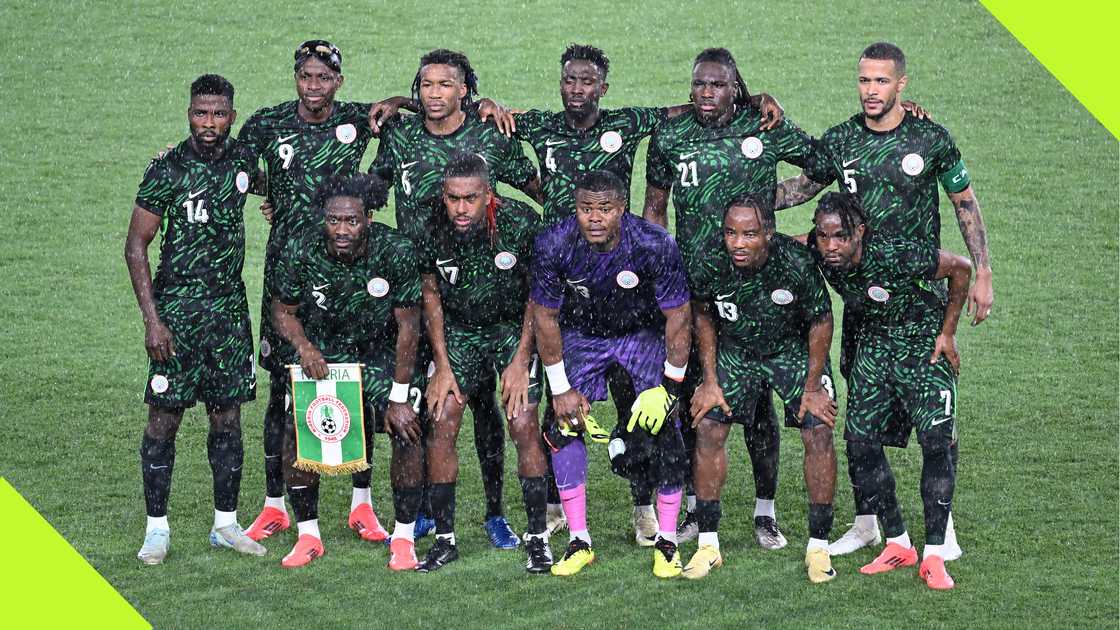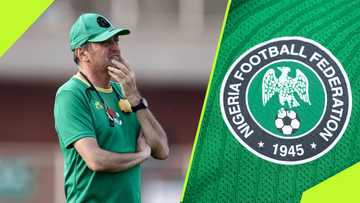Why Nigeria Suffered the Biggest Drop in FIFA Rankings Despite Ghana’s Poor Form
- FIFA recently announced its latest national team rankings for the month of November following the recent international window
- The new rankings saw Nigeria endure one of its steepest declines, surpassing even Ghana, whose struggles on the pitch have been well-documented during their poor run of form
- In this article, we delve into how the FIFA rankings system operates and explore the factors behind the Super Eagles' significant drop in the standings
The Fédération Internationale de Football Association (FIFA) recently released its latest national team rankings for November, sparking widespread discussion among fans and stakeholders.
This edition of the rankings, which many anticipated would reflect notable changes due to the flurry of competitive fixtures during the international window, delivered a particularly shocking outcome for Nigeria.

Source: Getty Images
The Super Eagles suffered a dramatic eight-place drop, plummeting from 36th to 44th—a development that has raised eyebrows across the football community.
Despite participating in two relatively inconsequential Africa Cup of Nations (AFCON) qualifiers, which ended in a draw and a defeat, many fans believed these "dead rubber" fixtures would have minimal impact on Nigeria's overall ranking.
However, the rankings proved otherwise, further intensifying scrutiny and disappointment.
The situation becomes even more baffling when compared to Nigeria's West African rivals, Ghana. Despite failing to secure a win since June and suffering an embarrassing home loss to Niger Republic followed by a draw against Angola, Ghana only dropped four places in the rankings—half the decline suffered by Nigeria.
Amid the flurry of reactions and questions surrounding the Super Eagles’ steep fall, we delve into the methodology behind FIFA’s ranking system to better understand the factors contributing to this unexpected outcome.
How FIFA rankings are calculated
The FIFA World Rankings, first introduced in December 1992, underwent a significant overhaul in August 2018.
The revamped system, known as "SUM," marked a shift from the previous method of averaging match points over time to a system that adds or subtracts points based on match results.
According to FIFA, the SUM algorithm adjusts a team's points by factoring in the relative strength of their opponents. This ensures that matches against higher-ranked teams carry more weight, while outcomes against lower-ranked opponents are judged accordingly.
The expectation is simple: higher-ranked teams are presumed to perform better against lower-ranked ones.
The new methodology also incorporates several refinements:
-Revised match weightings:
- Friendly matches are given less importance.
- Matches in major tournaments, particularly knock-out stages, are weighted more heavily.
- Knock-out stage protection: Losses in knock-out rounds of final competitions are excluded from calculations.
The SUM formula is expressed as:
P = Pbefore + I * (W – We)
Where:
- Pbefore = Points before the match
- I = Importance of the match
- W = Actual result
- We = Expected result
Impact on Nigeria’s Rankings
Applying these principles, Nigeria’s significant drop in the November rankings can be attributed to their performance against lower-ranked opponents.
Entering the international window at 36th in the world, the Super Eagles were expected to dominate their less-fancied opponents.
However, they only managed a draw and a defeat in the AFCON qualifiers, leading to a significant deduction in points.
In contrast, Ghana’s situation illustrates a different dynamic. Ranked lower than Nigeria before the window, Ghana’s loss to similarly lower-ranked opponents carried less impact under the SUM system.
This discrepancy explains why Ghana's four-place drop was less severe compared to Nigeria’s eight-place decline.
Despite this setback, the Super Eagles have a chance to reclaim lost ground during the next international window in March 2025. With strong performances during their World Cup qualification campaign, Nigeria could quickly climb back up the rankings.
Former Manchester United coach speaks on coaching Nigeria
Legit.ng in a separate report detailed that former Manchester United coach, Jonathan Hill, has expressed his interest in managing the Super Eagles of Nigeria.
The experienced tactician conveyed his confidence in his ability to achieve the desired results with the Nigerian team. Hill also disclosed that he has been closely following the progress of the Super Eagles.
PAY ATTENTION: Сheck out news that is picked exactly for YOU ➡️ find the “Recommended for you” block on the home page and enjoy!
Source: Legit.ng





